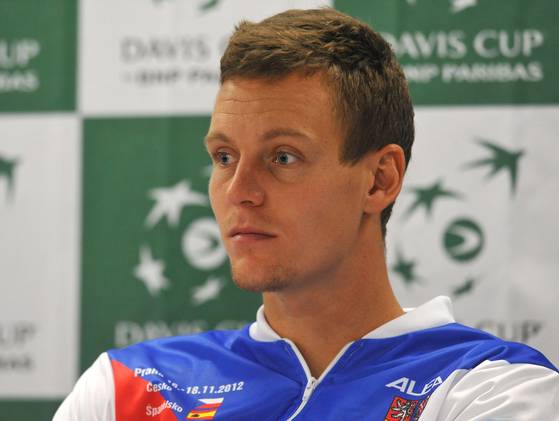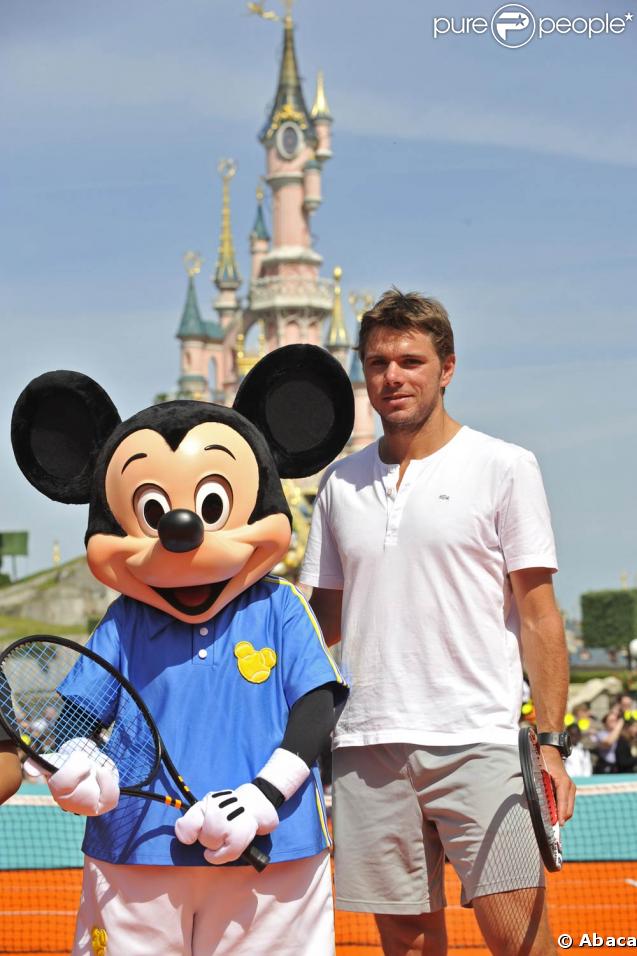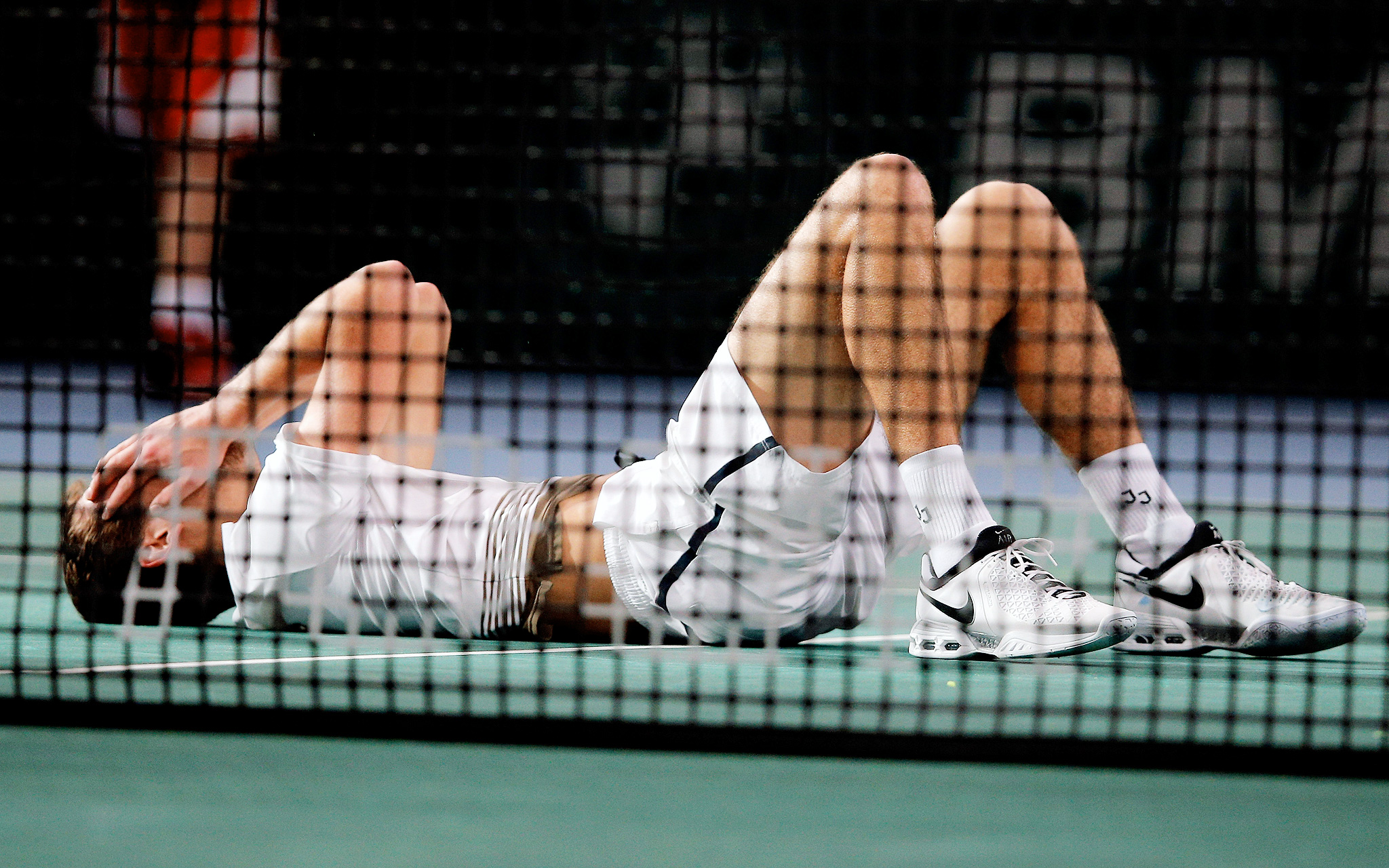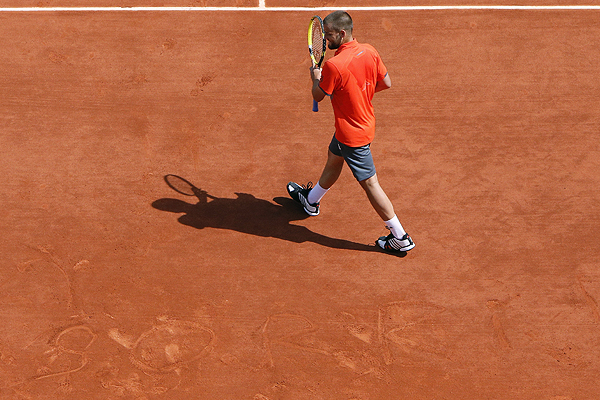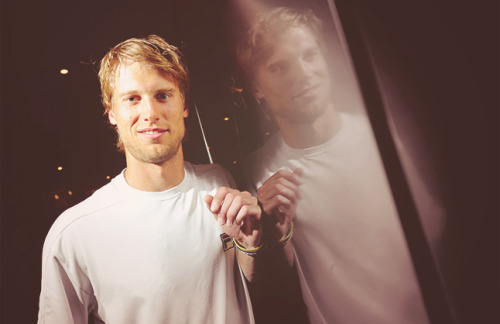With 2012 over and 2013 rushing towards us, I'm reviewing the season of the top 50 ATP and WTA players, and notable others, and making an informed guess (quiet at the back) at what 2013 is likely to bring.
Time to consider the top 2 male players in the world...
All images remain copyright of their respective owners.
#2 - Roger Federer (SUI)
Considering this year, Roger won his first Grand Slam since the 2010 Australian Open, 17th in total for those still counting, and won another 5 titles besides, including 3 at Masters 1000 level, and on top of all that returned to the #1 ranking for a spell, besting Pete Sampras's mark for most weeks spent overall at the #1 spot, you'd have to chalk 2012 up as a successful year for the Swiss maestro. And if it had some setbacks too then, well, it's not 2006 anymore.
The year starting a bit unevenly, with a rare walkover withdrawal from Doha in the SF, then a somewhat lacklustre display in losing to Rafa in the SF of the Australian Open after having won the first set. Eyebrows were raised when he lost to Isner on clay in the Davis Cup in a disastrous tie for the Swiss side at home. Nevertheless, he rebounded well, winning Rottedam, Dubai and Indian Wells on the trot, including wins over Murray and Nadal. A slightly surprising loss to Roddick in Miami followed, but perhaps less so considering his energy levels at that point. Again, he bounced back quickly with a title in Madrid on the slippery blue clay, but in Rome Djokovic asserted his credentials, dismissing Roger in the SF. At Roland Garros, Roger survived a 2 set deficit to a resurgent Juan Martin Del Potro, who was clearly starting to believe he could tangle with the best once more. In the end, though, it took Novak to stop Roger again, this time in straight sets, some vengeance for Djokovic for the SF surprise loss the year before. Roger reached the final in Halle but lost to Tommy Haas there, one more of those occasionally surprising losses Roger throws in these days.
At Wimbledon, however, Roger was ready. Disappointed by his 2 QF exits the last two years, he had a point to prove, and although he was 2 sets down to Benneteau in R3, he fought through, survived a tussle with Malisse, humbled Youzhny, and then handed a surprisingly easy 4 set defeat to Novak Djokovic, who seemed well below par. In the final he would face Andy Murray, who he had beaten in 2 previous Grand Slam finals. Murray was in his fourth, and still yet to win one, and in front of a home crowd to boot. Nevertheless the Scot started brightly, winning a tight first set, and coming very close to winning a second. Roger had other ideas though, and rolled back the years with some vintage grass-court tennis and levelled the match. Rain intervened early in the third set, and the roof was closed. If anything, Roger's level rose even more under the canvas, as the elements of wind and variable light were taken out of the equation. He took a vice-like grip on the match. Murray continued to play well, and tried to find solutions, but it wasn't to be. Roger played the occasion like a virtuoso, knowing exactly what play to use and when, and though it was a tight four sets, Roger played the better tennis on the day, lifted his 7th Wimbledon crown (matching Sampras and Renshaw for all-time highest number of titles), and with it, secured a return to the #1 ranking and guaranteed he would also break the Sampras #1 longest duration record too. Naturally he was overjoyed to recover the Wimbledon crown that had been his first Grand Slam win, and he went into the Olympics high in confidence.
He shook off an early loss in the doubles, and an early blip against Falla in R1, and reached the SFs relatively comfortably. There he met Juan Martin Del Potro, who had taken him to 5 at the French. This time, over best of three but with a long final set, Delpo came even closer, as they passed 6-6 in the final set, and kept going. The match wore on for over four hours, with nothing to separate them, until at last, Roger, perhaps drawing on the memories of his epic 17-15 5th set win over Roddick in 2009, prevailed 16-14 in the third. There's no question the length and difficulty of Roger's SF aided Murray, who, relatively speaking, breezed past Djokovic in 24 games total. Nevertheless, nothing should be taken away from Murray's performance - he came out full of confidence, displayed mental resolve like never before in a big match, and never gave Roger an opening to really exploit. Roger was flat, and many tactics he had previously employed against Murray weren't working - a combination of Murray's better play and Roger's own jadedness. Roger had to settle for the singles Silver medal, Murray winning Gold in 3 straight sets, dramatically reversing the Wimbledon final result of four weeks earlier.
Roger professed himself satisfied with his Olympic efforts, and moved on to Cincinnati, where he lifted the title, handing Djokovic a very rare bagel in the final as part of a 6-0 7-6(7) win. Djokovic failed to medal at the Olympics, losing the Bronze match to Del Potro, and seemed to have a bit of a hangover from that. Going into the US Open, Roger, as #1 seed once again, must have been feeling good about his chances. 3 straight sets wins and then a walkover as Mardy Fish withdrew with medical problems that killed his season, and Roger was in good shape for his QF against Berdych. And then one of those inexplicably flat performances happened, where Roger just seemed to have little command over all the weapons at his disposal. Berdych played an excellent match, his hard, flat hitting taking a lot of options away from Roger, and even though the Czech flinched and lost the third set, he reset and hit back decisively in the fourth. Roger played a poor match by his standards, out of nowhere, and he seemed rather shell-shocked by the loss - it seemed to hurt more than usual.
He won his two Davis Cup playoff matches against the Netherlands, and then headed out to Shanghai, where he lost to Murray in surprising fashion in the SFs. He seemed irritable, out of sorts, and his game, particularly his serving, was off, including the bizarre spectacle of him serving three double faults consecutively to hand over a break of serve, and a bizarre interlude where he seemed to gently pressuring the umpire to suspend player longer than necessary due to a few drops of rain. Murray's game has always irritated Roger, but rarely has this irritation been given such visible expression. Back in Switzerland, Roger made the finals of his beloved Basel event, but Juan Martin Del Potro, who had been running Roger increasingly close all season, finally got the better of him, though it needed a final set tiebreak to do it. At the World Tour Finals, Delpo struck again, handing Roger another 3 set defeat in the RR stages, but Roger won against Tipsarevic and Ferrer, and then defeated Andy Murray in the SFs before losing a tight match to Novak Djokovic in the finals.
As said earlier, 2012 must be considered a successful year for Roger, and at 31 he's still been competing with the very best, getting to the latter stages of virtually every big event he has played. Will 2013 bring more of the same? In my view, yes and no. I expect him to continue to threaten at the Slams and Masters 1000s - losses against all but the best at these tournaments are likely to continue to be rare. But I don't see him winning another slam in 2013 - indeed I feel the 7th Wimbledon title in 2012 will bookend his slam career with the first one won there, back in 2003, and he will win no more. My feeling is, as Roger begins to reduce his playing schedule slightly, that while he wants to continue to Rio, he has absolutely nothing left to prove now, and as his twin girls get older, his focus might become more split. Though it may take a few years, in 2013 I expect to see Roger slowly beginning the disengagement process from the hectic lifestyle of pro tennis. A few more weeks off, less worry about where the ranking is and more focus on being ready for a select handful of tournaments. At these, he will still be dangerous, but younger, and perhaps hungrier, players now seem regularly capable of having the measure of him. We shouldn't feel sad about that, it is the cycle of things, and he's already had more wonderful years than one mortal has any reason to expect. That should be celebrated.
#1 - Novak Djokovic (SRB)
2012 was a genuine mixed bag for Novak Djokovic. It began with an amazing feat of sustained endurance, hit some very slippery patches in the middle, but ended with a feeling that equilibrium had been restored, which augurs well for the coming season.
It began, of course, at the Australian Open, where he beat Ferrer in 3 sets, Murray in a 5 hour 5 set marathon, and then Nadal in another 5 setter that ran closer to 6 hours - an extraordinary display of mental and physical fitness. This was his 5th Grand Slam win, and he now held 3 concurrently - only the French Open eluded him for the Career Grand Slam, and if he won it in 2012 he would become the first since Laver to hold all 4 majors at the same time, albeit not in the same calendar year. Much was now on the line.
Djokovic lost to Murray in the SFs in Dubai - not necessarily a major surprise since Andy seemed better against Novak over best of 3 than over best of 5. Novak surprisingly lost to Isner in the SFs in Indian Wells, albeit it took a final set tiebreak, which can be something of a lottery. In any case, he bounced back by winning Miami, beating Murray in the final and didn't drop a set all tournament. On the clay in Monte Carlo, he faced Rafa in the final, but lost comfortably in straight sets, halting a run of wins over the Spaniard since Indian Wells 2011 at seven. He lost in the QFs of Madrid, deploring the slippery blue surface, and then fell again against Rafa in the final of Rome - closer this time but same result. The 2011 situation, where Novak really seemed to be in Rafa's head, had clearly unwound. Novak pressed on at Roland Garros, defeating Tsonga and Federer en route to the final, albeit not without drama. He was 2 sets down to Andreas Seppi in R4, and Tsonga had him on the ropes in the fourth set in the QF, but Novak escaped both situations, his mental strength once again proving a decisive factor. Nevertheless, in the final, which was ultimately completed on Monday due to rain, Nadal once again took the spoils - he needed 4 sets to do it, but he completed the sweep over Novak on the clay in 2012.
This was disappointing by the highest standards Novak was now compared to, and matters didn't improve at Wimbledon. Although the defending champion made it to the SFs, he played a disappointingly flat match, seemed to lack belief or conviction, and ultimately was handled more comfortably than anyone would expect by Roger Federer. Novak's ability to take a disappointment and bounce back quickly would be tested a number of times in 2012, but perhaps no time more so than the Olympic Games. A proud Serb, who no doubt wanted to bring home the Gold for his nation, he nevertheless seemed to succumb to the overwhelming pressure of hope and expectation that he somehow had not felt as severely in Davis Cup - perhaps due to the team nature of that competition. In any case, though he made it to the SF match, he played a somewhat nervy match against Murray, who handled the occasion with great aplomb, and advanced to the Gold Medal Match 7-5 7-5, with Djokovic faltering at the end of both sets in uncharacteristic fashion. This must have been deeply disappointing, and he was unable to find solace in a Bronze medal, as Del Potro claimed this honour for Argentina, leaving the Serb empty-handed.
And yet, Novak did rebound quickly, with a Masters 1000 win in Toronto the following week, and a Cincy Final, where he was handed a bagel by Federer but only just failed to take it to a third set. He seemed back to his imperious best in New York at the US Open, avenging himself upon Del Potro in straight sets in the QFs, and after a very slow start, dismissing Ferrer in 4 sets in a SF match that was completed on the Sunday. This put Novak at a disadvantage, as Murray's SF had finished on Saturday, and in the end this might have had more impact than has generally been acknowledged. The US Open Final began in extremely blustery conditions, which Murray handled better. Though the first two sets were turbulent, torrid affairs, Murray mentally remained stronger more consistently, and won them both. But as the wind calmed slightly and Djokovic dug in for the fight, Murray hit a physical wall, and Djokovic claimed the third and fourth sets quickly relative to the first two. However, the match was now 4 hours old, and Djokovic seemed physically spent by his efforts to get back into it. Murray took a double break lead, and while Djokovic briefly looked like he might get back into it, cramping visibly set in, hampering his movement. Murray tasted blood and liked it, and calmly snatched the set, and the title, from the defending champion.
At this point in the season, things were looking a tad grim for Novak, relatively speaking. Pushed back to #2 by a resurgent Federer in the mid-season, he had endured a steady series of losses against the other big combatants - Nadal on the clay, particularly Roland Garros, Federer at Wimbledon, Murray and Del Potro at the Olympics, and Murray again at the US Open. It seemed like his capacity to win the big matches was not what it had been. However, he quickly dispelled this myth. In Shanghai, he saved 5 match points in the final against Murray, to come back and win in 3 sets. Though he lost early in Paris, he handed defeats to Tsonga, Murray, Berdych, Del Potro and Federer to lift the title at the O2 arena, his second season-ending championship, and re-establish some authority over his fellow top 10 players. In doing so, he recaptured the #1 ranking, and though his year was a turbulent one, he started and ended it on top.
Here's what I expect in 2013. With Nadal's prospects very uncertain, and anno domini increasingly likely to impact Federer, common wisdom suggests Murray will be Djokovic's great rival in the coming season. I would concur with this, although I think there's a chance that Del Potro and someone else, perhaps Berdych, might muscle their way in at one or more of the biggest events. I do expect Djokovic to maintain the #1 ranking, provided he avoids any injury concerns, which he has largely been able to do since the end of 2011. Djokovic is much more consistent when compared to Murray, and he is at least one level above Murray on clay, and this is likely to prove decisive in the rankings battle. When it comes to the majors, I would expect Djokovic to lift at least 1, more likely 2, and perhaps it's time for him to win Roland Garros and complete his own Career Grand Slam. It should be another stellar year for the brightest current star of the tennis sky.









